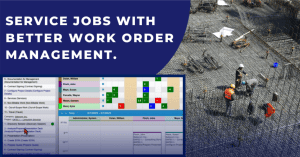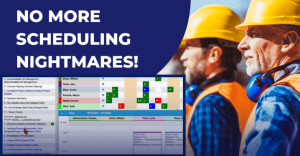Written by Jason Stoke
Managing a field service workforce is a complex balancing act, especially without the right tools. Customer satisfaction is paramount, and achieving it depends on how effectively field technicians are coordinated, tasks are scheduled, and service software is integrated. Many organizations with field service components use enterprise resource planning (ERP) systems to support field operations, service delivery, and workforce management, but extending relationship management can significantly improve operational success.
Field service businesses relying solely on ERP systems may face unnecessary challenges or miss out on efficiencies that benefit both field workers and customers. Comprehensive enterprise software that combines ERP and CRM capabilities with field service management (FSM) software eliminates critical gaps in service operations.
For organizations specializing in field service, ERP systems streamline functions like accounting, resource management, and supply chain operations. FSM software goes further, providing targeted field service support—such as mobile interfaces, advanced scheduling, route tracking, and customer service tools—that bridge the gap between ERP systems and real-world field service. This combination delivers real-time data visibility into job progress and improves asset management, enabling teams to access job details quickly.
What is ERP for Field Service?
Enterprise resource planning (ERP) is software that manages core business functions in one place: finance, supply chain management, manufacturing, operations, and human resources. ERP, typically deployed as integrated applications, serves as a single source of truth for functions previously managed separately. This unified approach is a key advantage of modern enterprise software.
For field service businesses, ERP acts as the system of record for supply chain management, order management, and manufacturing. Because supply chain management is vital in field service, ERP systems often integrate with finance, HR, or CRM tools. Ultimately, ERP is more than a finance tool or CRM—it’s a broad umbrella of business software, offering extensive capabilities including accounting and financial functions. Leveraging ERP and CRM capabilities further unifies inventory and relationship management for a complete solution.
ERP is commonly used in field service to:
- Create and track purchase orders for new installations and repairs
- Enhanced with field service software, these functions ensure real-time data updates for efficient scheduling and dispatching.
- Manage inventory to track equipment usage and ensure jobs are scheduled when necessary equipment is available
- This helps maintain customer satisfaction by guaranteeing resources are always on hand.
- Track high-level capacity for work orders, based on worker numbers and general availability
- When combined with FSM solutions, this enables targeted workforce planning.
- Generate work orders with job details and unique IDs for tracking
- Managers gain full visibility into each assignment and can access job details seamlessly.
- Generate invoices based on job type, time spent, or other factors
- Integrated ERP and FSM software can automatically pull this information into billing systems.
- Track accounting details, from service costs to high-level revenue comparisons
- This supports profitable customer relationship management through detailed tracking.
ERP vs. CRM for Field Service: What’s the Difference?
ERP software is designed to help organizations manage internal resources—inventory, products, work capacity. CRM software, by contrast, helps organizations manage external relationships with customers. CRM platforms are particularly useful for field workers seeking to understand and engage with customers, and for sales teams aiming to improve performance. Stronger relationship management leads to increased customer satisfaction and loyalty.
Some ERP systems include CRM features like contact management, client interaction tracking, and marketing campaign management. Others integrate with standalone CRM systems, which typically offer more advanced features and are more user-friendly for sales or customer success teams. This integration can serve as an effective service software foundation for field service teams.
The Gaps in ERP and CRM Software
Using ERP to track internal resources and CRM for customer interactions is essential to growth and success in field service. However, even robust ERP and CRM systems leave gaps in the field service equation.
For example: How are work orders translated into specific jobs on the schedule? What criteria guide job assignments? Once assigned, how do you know where a technician is or if the job is complete? How are schedule changes communicated? Without specialized field service software or FSM solutions, these details can become unmanageable and negatively impact customer satisfaction.
Field workers and managers often struggle to manage daily tasks directly through ERP or CRM tools. Key challenges include:
Lack of Visibility – ERP solutions offer tracking and reporting but fall short in providing all the information needed to fully understand the workforce. ERP and FSM systems prioritize different information types.
A field service company may use ERP to track inventory across hubs and back to the shipper or OEM, but ERP may not track inventory per technician. In field service, managers need to know which technicians have the right parts or expertise for specific jobs at specific times. FSM software fills this gap by providing per-technician and per-job data for real-time review, streamlining scheduling and resource allocation.
Limited Ability to Track Essential Job History – Customers expect personalized service, which requires field workers to be fully prepared. This means capturing and accessing job details and documentation—customer data, field notes, site and safety info—even in the field.
ERP systems capture certain information, but FSM systems go deeper into job history and asset management, helping technicians deliver high-quality service. FSM can track detailed equipment histories, movements, service events, and subcomponent records.
Inability to Schedule and Dispatch Field Workers – ERP solutions may offer basic scheduling, such as appointment times after purchases. However, they lack intelligent, flexible scheduling and dispatch capabilities needed for efficient field workforce management.
Field workers have varying schedules, skills, qualifications, and preferences, and require real-time data updates. ERP systems are not designed to manage dynamic field service schedules to the level dispatchers and managers need to keep customers satisfied.
Limited Single Source of Truth – ERP software captures and manages data like accounting details, purchase orders, inventory, and invoices. However, its capabilities are not robust or specific enough for field service to provide every data point needed for informed decisions.
Field service software and FSM solutions are required for preventative maintenance, labor-based quoting, performance analysis, and utilization.
Lack of Streamlined Communication – Great employee experiences depend on tools that streamline communication with back-office staff and customers. While ERP software facilitates information sharing among administrative departments, it lacks direct, contextual communications needed by field workers.
Field service management software includes out-of-the-box tools for field communication, such as SMS notifications, mobile app push notifications, and location data—crucial for field employees, especially when using platforms like Salesforce Field Service or Oracle Field Service.
Deskless workers connect to systems differently than in-office staff. They are less likely—or unable—to access CRM or accounts payable directly during daily work. Even if possible, the data volume is overwhelming between jobs.
Field workers need seamless connections between the system of record (ERP) and their daily work. This is where FSM comes in.
FSM balances the needs of the business (operational efficiency), the customer (timely, quality service), and the employee (smooth work experience). This balance improves customer satisfaction by giving managers and technicians immediate insight into job requirements, inventory, and relationship management details.
How Field Service Management Software Bridges the Gaps in CRM and ERP Systems
FSM software is designed for field service workers and organizations. Its capabilities, paired with ERP and CRM systems, enhance field service operations. Implementing FSM delivers benefits that ERP and CRM alone cannot:
Create a System of Engagement to Complement the System of Record
A key difference: FSM is a system of engagement, while ERP is a system of record.
A system of record is the authoritative data source for a business area—HR software for employee information, CRM for customer data, ERP for supply chain and order management.
A system of engagement is a platform used directly by workers to find, share, and communicate information. Systems of engagement, like email and learning management systems, present essential information in a user-friendly way.
Sometimes, the system of record is also the system of engagement—accountants updating budgets daily may work primarily in ERP finance modules. But for most organizations, especially those with field workers, a system of engagement needs to aggregate information from each system of record. Otherwise, field workers waste time tracking down information, which is inefficient and risky.
FSM software serves as the system of engagement, allowing field workers to view and act on crucial data in one platform. Within FSM, technicians can pull work orders from ERP, review customer history from CRM, find product data from supply chain databases, and access quote and invoice details. Managers use FSM scheduling tools to assign jobs based on qualifications, availability, and location. This coordination streamlines customer relationship management and service delivery.
Increase Transparency Across Field Service Operations
Intelligent FSM software offers a mobile-first approach with dynamic tools for field employees. Where ERP and CRM may provide limited mobile functionality, FSM is an end-to-end solution for real-time, accurate data collection. Even at customer sites, workers can capture details like travel time, customer feedback, schedule adherence, and more. This data is seamlessly transferred back to enterprise systems.
These insights improve workforce visibility, resulting in a unified view of operations. Increased transparency enables accurate resource and capacity planning, efficient scheduling, reduced service costs, and improved customer satisfaction.
Easily Track Job History and Customer Preferences
ERP systems store basic customer details, and CRM helps manage client data to build relationships and drive sales.
FSM software, however, is built to meet the unique goals of field service organizations—meeting customer expectations at every service delivery. It tracks detailed data like previous invoices, receipts, and preferences in one centralized place, amplifying relationship management and driving customer satisfaction.
If a customer requests past maintenance records or wants the same technician, FSM enables quick access to job details—without searching through paper documents or files.
Streamline Workflows
Running a successful field service operation requires efficient processes. ERP and CRM can organize certain functions—accounting, marketing, sales—but lack holistic capabilities to streamline operations.
FSM software picks up where ERP and CRM leave off, optimizing scheduling, routing, data collection, and analysis. With everything managed in a single source of truth, every aspect of your field service business runs smoothly, eliminating duplicate efforts and manual processes.
Improve Communication
Effective communication is essential for strong field service operations. Field workers need mobile, dynamic tools to stay informed, prepared, and safe, while managers want real-time workforce visibility. CRM and ERP are not built for this purpose.
Robust FSM technology empowers field technicians with streamlined communication, without sacrificing on-site data needed to measure productivity and success. Supported by a single app, technicians avoid toggling between calls, texts, and emails, and can communicate with back-office staff and customers instantly.
Seamless Integration with Existing Systems
Some ERP systems offer limited field service functionality, but FSM software is purpose-built for field service, with features ERP and CRM cannot replicate. Companies seeking advanced scheduling, inventory, asset, and customer relationship management can maximize results by adopting ERP and FSM strategies.
Modern FSM software complements other technologies, making the tech stack greater than the sum of its parts. ERP, CRM, HR, payroll, and other systems each provide unique value. The right FSM solution integrates them all, fulfilling the needs of field workers and customers, breaking down silos, and generating interoperable data for better decisions. Integrating with solutions like Salesforce Field Service or Oracle Field Service creates a robust infrastructure for the entire company.
Essential Field Service Management Software Features
When choosing FSM software to fill gaps left by ERP and CRM systems, select a solution that extends their capabilities for greater operational efficiency and success. Look for technology that offers:
- Mobile-First Functionality – Field service workers need tools to communicate, access information, and store key data from any location. The FSM solution should be intuitive, user-friendly, and work on any mobile device to enhance worker safety.
- Easy Data Sync with System of Record – Capturing everything that happens in the field is vital. The tool must be simple for field use but robust for managers and back-office staff to access accurate data in each system of record. FSM should allow workers to capture photos, signatures, and forms, automatically syncing to ERP, HR, CRM, etc. Offline functionality is ideal, letting workers take notes without internet and syncing when reconnected.
- Customized and Prioritized for Your Workforce – Every field service business is unique, so FSM and ERP implementations should be customizable. The tool should let you prioritize information—customer service metrics, efficiency metrics, or others—in your default view. Seek solutions with powerful integrations tailored for your workforce.
- Automated Scheduling and Dispatching – FSM solutions must handle complex scheduling, matching workers to jobs based on qualifications, location, and preferences, and update in real time. Automation and scalability are essential to avoid customer service issues like cancellations or delays, common with manual scheduling. Advanced scheduling dispatch is a key differentiator for leading service software providers.
- Real-Time Communication – Field workers should easily notify the back office of job site issues or changes. Invest in FSM technology that enables real-time job updates, ensuring the best possible customer service and quickly addressing concerns.
- Optimized Routing – Outdated estimated service windows frustrate customers. FSM software should provide real-time, precise routing for field workers, so appointment times are accurate and customers know exactly when to expect service.
- Seamless Integration – Maximize software investments by ensuring all systems work together for workforce visibility and business insights. FSM should integrate easily with ERP, CRM, payroll, HR, and other systems, connecting disparate data sets. This ensures field workers have accurate customer data from multiple sources and are fully prepared for every interaction. By integrating ERP and CRM solutions with FSM, you create a software hub that fosters transparency and efficiency.
Make the Most of Your ERP and CRM Systems
ERP and CRM solutions are essential for field service businesses, empowering field workers to serve customers effectively. However, without FSM software designed for end-to-end field service operations, you risk missing key insights, benefits, and overall success. When combined with service software supporting inventory management and real-time data sharing, your teams stay aligned and focused on delivering top-level customer satisfaction.




